Part II: In Their Own Words
This section features the extended comments and biographies of the 35 individuals interviewed for this report. Their views on the ramifications of a military strike against Iran are shaped by their personal and professional experiences with the Iran-Iraq war and Iran’s history of political turmoil. Collectively, these interviewees represent some of the most respected and influential activists and cultural leaders in Iranian society and thereby offer valuable insights into the perspectives of Iranian civil society regarding the military option.
Mohammad Seifzadeh | Lawyer
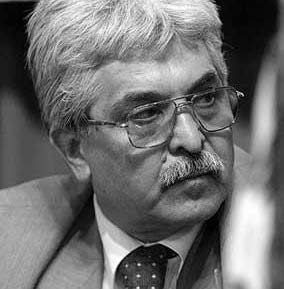 Seifzadeh is a prominent human rights lawyer and a founding member of the Defenders of Human Rights Center, along with Nobel Peace Prize Laureate Shirin Ebadi. He has represented numerous political activists, human rights defenders, and journalists accused primarily of national security crimes. Seifzadeh’s persistence in drawing attention to the failures of Iran’s judiciary has led to his own prosecution. In November 2010, he was sentenced to nine years in prison and a ten-year ban on practicing law on the charge of “acting against national security.” An appeals court reduced his sentence to two years in June 2011. He is currently being held in Tehran’s Evin Prison.
Seifzadeh is a prominent human rights lawyer and a founding member of the Defenders of Human Rights Center, along with Nobel Peace Prize Laureate Shirin Ebadi. He has represented numerous political activists, human rights defenders, and journalists accused primarily of national security crimes. Seifzadeh’s persistence in drawing attention to the failures of Iran’s judiciary has led to his own prosecution. In November 2010, he was sentenced to nine years in prison and a ten-year ban on practicing law on the charge of “acting against national security.” An appeals court reduced his sentence to two years in June 2011. He is currently being held in Tehran’s Evin Prison.
“We have the experiences of World Wars I and II and experienced the Iran-Iraq war up close. We know that the events following these wars eliminated any social progress or political achievements. After the Iranian Constitutional Revolution, all the dedication and lives that were given for democracy and freedom resulted in Reza Shah’s dictatorship and World War II, and Iran lost so much. Generations of intellectuals are killed or imprisoned in the middle of these wars and democracy becomes barren.”
“We also saw that the Iran-Iraq war led to what happened in the 1980s. Violent crimes rose and a revolution whose main slogan was ‘freedom’ and ‘independence,’ and had chosen the Islamic Republic in order to realize these goals, instead reached a point where it killed and oppressed its opponents. Supporters of human rights like us, who established the Defenders of Human Rights Center, were persecuted and imprisoned. In the end, the goals of the 1979 revolution were not realized. The social atmosphere we experienced immediately after the revolution was more open. All political activists and different groups could speak and be active and have their rights relatively respected. But as the war started, the atmosphere abruptly closed and society faced turmoil, violence, and assassinations, and groups were eliminated. Universities were shut down and their environments became restricted. Limitations were imposed on students, faculty, and staff. Generally, a new war would take us to a very bad environment. We are still paying for the violence that past wars forced on us.” “If a war were to take place right now, the atmosphere would definitely become more restricted and more limitations would be imposed upon intellectuals, human rights activists, social elites and students. If the West wishes to realize democracy, freedom, and human rights worldwide it should consider options other than war.”
“Through [our Center], my colleagues and I established the National Peace Council (NPC). For a while during former US President Bush’s term, war fever soared and a military attack on our country appeared probable. With the NPC we were able to encourage social elites to speak out against war. There were also anti-war demonstrations all over Europe, organized by my colleague [Nobel Peace Prize Laureate] Shirin Ebadi.”
Simin Behbahani | Poet
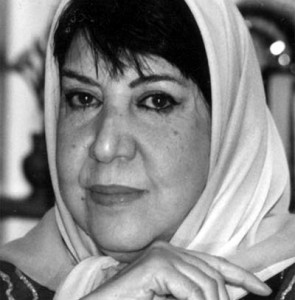 Born in 1927, Simin Behbahani is amongst Iran’s most celebrated living poets and important figures in Iran’s women’s rights movement. She won the Carl von Ossietzky Medal by the International League for Human Rights in 1999. Government authorities have targeted Behbahani for her outspoken advocacy on behalf of Iranian women. In March 2010, authorities stopped her while she was attempting to board a plane to Paris to deliver a speech on the occastion of International Women’s Day and forbade her from traveling.
Born in 1927, Simin Behbahani is amongst Iran’s most celebrated living poets and important figures in Iran’s women’s rights movement. She won the Carl von Ossietzky Medal by the International League for Human Rights in 1999. Government authorities have targeted Behbahani for her outspoken advocacy on behalf of Iranian women. In March 2010, authorities stopped her while she was attempting to board a plane to Paris to deliver a speech on the occastion of International Women’s Day and forbade her from traveling.
“We have a very bad experience with war. We endured eight years of war with Iraq which was all a loss and not a penny of benefit. We fell down for years, the energy of our youth and our national wealth was wasted. Our youth were killed. Now, even if they give us millions in gold, I will never agree with war.”
“If the rulers are cruel people themselves should rise against them and change the conditions of their country, just as we see in other countries these days. Generally, I don’t like wars and I expect the United States, a very powerful country in the world and one with a good name, to act against war, because war does not solve anything.”
“Conditions for writers do not improve after a war. What a bad person would I need to be to wish a war, so that my [banned] books could be published. Even if I am buried under a ton of dirt and not even one line of my writings remain I would never agree to a war, not only in my own country, but in any corner of the world.”
Tahmineh Milani | Filmmaker
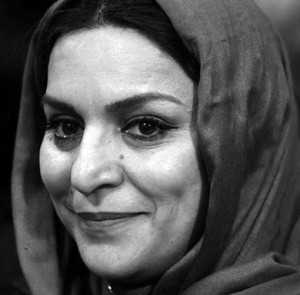 Born in 1960, Tahmineh Milani is an internationally acclaimed screenwriter and filmmaker. As a feminist, Milani’s films explore the many struggles of women in Iran. Her first film, “Bache Haye Talaagh,” received the top award at Fajr Film Festival in 1989. In 1994, her film “Do Zan,” won the award for best screenplay at the Fajr Film Festival. Milani was arrested in 2000, after her film “Nimeh Penhan” was released and charged with “acting against national security,” “enmity with God,” and “creating public anxiety through artistic expression.” She made the film “Tasvieh Hessab” after her detention in the General Ward of Evin Prison about intmates she met there.
Born in 1960, Tahmineh Milani is an internationally acclaimed screenwriter and filmmaker. As a feminist, Milani’s films explore the many struggles of women in Iran. Her first film, “Bache Haye Talaagh,” received the top award at Fajr Film Festival in 1989. In 1994, her film “Do Zan,” won the award for best screenplay at the Fajr Film Festival. Milani was arrested in 2000, after her film “Nimeh Penhan” was released and charged with “acting against national security,” “enmity with God,” and “creating public anxiety through artistic expression.” She made the film “Tasvieh Hessab” after her detention in the General Ward of Evin Prison about intmates she met there.
“We must not forget that Iranians are nationalistic and will not give even one molecule of their soil to foreigners. I lost a brother to the Iraq war, something I have never talked about and no one knows about. He was a soldier doing his compulsory military service. He suffered spinal injuries during the war and was paralyzed for ten years, and then he died. My mother died the following year. What did they die for, really? Sometimes people lose their lives to natural catastrophes, but sometimes we throw bombs and kill people. But why? Foreign governments may see us as inconsequential, but they have no right to think this way. We are a decent and good nation.”
“I don’t believe any country is authorized to take military action against Iran. As people experience cultural growth, they can do better things and find ways to reach democracy.”
“Under the current circumstances, I believe there is a probability that the Iranian government would use a war to establish its own political power, just as this happened during the eight-year war between Iran and Iraq. The government can use the war as an excuse and delay people’s demands. It is easier to control and suppress people under war conditions.”
Ahmad Ghabel | Theologian
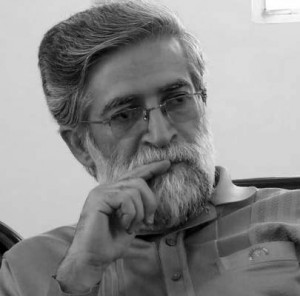 Ahmad Ghabel is a well-known theologian and a student of the late dissident cleric Grand Ayatollah Hosseinali Montazeri. He has written numerous widely circulated open letters to Iran’s Supreme Leader criticizing the country’s social and political conditions. Over the last decade, Ghabel has been arrested numerous times, most recently in December 2009 on his way from Mashad to Qom to participate in the funeral of Ayatollah Montazeri. He has spent 170 days in prison.
Ahmad Ghabel is a well-known theologian and a student of the late dissident cleric Grand Ayatollah Hosseinali Montazeri. He has written numerous widely circulated open letters to Iran’s Supreme Leader criticizing the country’s social and political conditions. Over the last decade, Ghabel has been arrested numerous times, most recently in December 2009 on his way from Mashad to Qom to participate in the funeral of Ayatollah Montazeri. He has spent 170 days in prison.
“Any group who may take power following a violent change of political order would also resort to violence to suppress the population. This has been a historical problem for Iranians; that any group who reaches political power resorts to violence to suppress its opposition. If we want to put an end to this process, we must seek change through non-violent means.”
“Bombs cannot always distinguish between military targets and the civilian population. Also, the military personnel are Iranians who have families. The fact that the government doesn’t treat its population well doesn’t justify foreigners dropping bombs.”
“A military attack will be tremendously harmful to the people’s aspirations because our hearts and minds are not with foreign intervention. Assuming that a political change would follow an attack and the current system is replaced as a result, the new system would automatically be condemned because it had been empowered by foreign intervention. The time required for any new government to build trust with the people would be valuable time lost. Iranians have a historical memory of foreign interventions.”
“This country doesn’t belong to the Iranian government but to the Iranian people. We have no right to endanger the lives of a people.”
“When foreign forces want to fight for our rights it won’t be costless. They will impose heavy costs on the nation. However, in 1991 [during the Gulf War] the Iraqi infrastructure was bombed under the assumption that they were bolstering the Iraqi regime. I recall, they even bombarded powder milk factories in Baghdad. Or for example in Serbia, even bridges were bombarded. In all of these wars, industrial centers and infrastructure was destroyed despite being part of a nation’s wealth. During all these wars the countries’ economic infrastructure and social services were destroyed. These are part of a nation’s backbone. If Iran cannot rebuild and restore its infrastructure for decades to come, it will obviously be a huge setback. I don’t think any rational mind would accept such an outcome.”
“Considering the regime’s lack of mercy towards its opponents and the continuous accusation that opponents are foreign agents, if there is a military strike, the biggest damage will fall on national and religious opposition groups in Iran. It is even possible that their lives will be threatened.”
Mohammad Maleki | Academic
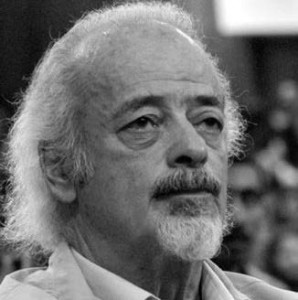 Born in 1934, Maleki is a pro-democracy activist, academic, and former Chancellor of Tehran University. He was active during the 1979 revolution and immediately afterward became Chancellor of Tehran University and professor of Health and Food Industries. On 12 July 1981, authorities arrested Maleki after he criticized the closure of Iran’s universities in the early 1980s. He spent five years in prison under harsh conditions. After the 2009 presidential election, Maleki criticized the government’s crackdown and security forces arrested him on 22 August 2009. He spent 191 days in prison before being released on bail. Maleki is bedridden at home suffering from prostate cancer, heart disease, and diabetes.
Born in 1934, Maleki is a pro-democracy activist, academic, and former Chancellor of Tehran University. He was active during the 1979 revolution and immediately afterward became Chancellor of Tehran University and professor of Health and Food Industries. On 12 July 1981, authorities arrested Maleki after he criticized the closure of Iran’s universities in the early 1980s. He spent five years in prison under harsh conditions. After the 2009 presidential election, Maleki criticized the government’s crackdown and security forces arrested him on 22 August 2009. He spent 191 days in prison before being released on bail. Maleki is bedridden at home suffering from prostate cancer, heart disease, and diabetes.
“An attack by foreign forces will harm everything. It is better that Iranians be allowed to solve their problems. They are well aware and conscious of what they need to do and there is no need for resorting to violence because it will not lead to any positive developments. If Iranians are seeking liberty, justice, and equality, they should develop their own means for achieving them.”
“A military intervention will undoubtedly lead to a much more closed environment inside the country and give the regime the perfect excuse to oppress the people even more.”
Fakhralsadat Mohtashamipour | Activist
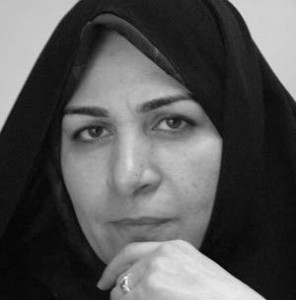 Fakhralsadat Mohtashamipour is a member of the Islamic Participation Front, a reformist political party. She previously served as the General Director of Women’s Affairs at the Interior Ministry and was Chair of the Board of Directors of the NGO, Women History Scholars. Mohtashamipour is married to Mostafa Tajzadeh, who was Deputy Minister of the Interior during Khatami’s presidency and was imprisoned after the 2009 presidential election. She has been a vocal advocate of the rights of her husband and other political prisoners. On 1 March 2011, she was arrested during a peaceful protest and still in prison as of this writing. She was hospitalized after going on hunger strike in prison to protest her husband’s detention.
Fakhralsadat Mohtashamipour is a member of the Islamic Participation Front, a reformist political party. She previously served as the General Director of Women’s Affairs at the Interior Ministry and was Chair of the Board of Directors of the NGO, Women History Scholars. Mohtashamipour is married to Mostafa Tajzadeh, who was Deputy Minister of the Interior during Khatami’s presidency and was imprisoned after the 2009 presidential election. She has been a vocal advocate of the rights of her husband and other political prisoners. On 1 March 2011, she was arrested during a peaceful protest and still in prison as of this writing. She was hospitalized after going on hunger strike in prison to protest her husband’s detention.
“International actors should focus on negotiations and not military confrontation. It is unimaginable that a military strike could resolve Iran’s problems or create a more open atmosphere. When we have a democratic movement and the ability for mass participation to bring about positive change, then war is certainly not the answer. We believe that with some patience and resistance the people can take society in a direction away from this militarized and coup-like atmosphere.”
“When you speak of freedom of opinion and free elections, these values are in opposition to the beliefs of the coup leaders [current government]. This does not mean that efforts [for reform] will be unsuccessful, however, it requires patience, persistence, attention, and enlightenment in society. Everyday people become more informed in regards to their society and their problems.”
“If there is a military strike against Iran it will certainly create a security state. Using war chatter [government officials] try to pressure the society, and to hinder civil society’s activities by accusing them of aiding the United States to attack Iran and helping the enemy. [In the case of war] there may be life threats made against civil society activists, and thus increased pressure on them. These are serious issues. In today’s atmosphere they are waiting for any sort of excuse. This is because war is the regime’s lifeline. They depend on it. They can thrive in a war environment.”
Mohammad Ali Dadkhah | Lawyer
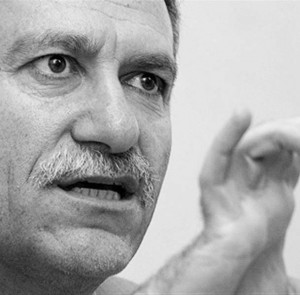 Mohammad Ali Dadkhah is a prominent human rights lawyer and a founding member of the Defenders of Human Right Center, along with Nobel Peace Prize Laureate Shirin Ebadi. Dadkhah has represented numerous prisoners of conscience, including Gonabadi Dervishes, a persecuted religious minority, and opposition activists. On 8 July 2009, security forces detained Dadkhah as part of a crackdown on human rights lawyers following the disputed 2009 presidential election. On 3 July 2011, a lower court sentenced him to eight years in prison for “propaganda against the regime,” and “cooperation for soft overthrow of the regime,” among other charges.
Mohammad Ali Dadkhah is a prominent human rights lawyer and a founding member of the Defenders of Human Right Center, along with Nobel Peace Prize Laureate Shirin Ebadi. Dadkhah has represented numerous prisoners of conscience, including Gonabadi Dervishes, a persecuted religious minority, and opposition activists. On 8 July 2009, security forces detained Dadkhah as part of a crackdown on human rights lawyers following the disputed 2009 presidential election. On 3 July 2011, a lower court sentenced him to eight years in prison for “propaganda against the regime,” and “cooperation for soft overthrow of the regime,” among other charges.
“Human rights advocacy aims to promote peace, stability, and prosperity of human beings. In contrast, a military attack means the killing of innocent human beings for no fault of their own. What kind of rationality could justify and accept such an action?”
“As someone who is engaged in the protection and promotion of human rights, I don’t believe a military attack would resolve any of our current concerns. Indeed, Iranian society’s attitude towards anyone who would advocate war under the guise of human rights and democracy would be terribly negative.”
“If we look at the experiences of countries such as Iraq or Afghanistan, or any other country where legitimate human rights concerns were exploited for justifying military intervention, we see that there is no peace in such countries. We must believe in the fact that our need is to promote dialogue and rational interactions to solve our problems. The bitter experience of war should not be repeated. We should learn our lessons and plan accordingly.”
Hamid R. | Journalist
Hamid R. is a respected reformist journalist and editor. Several of the publications he has worked for have been banned by authorities. In his writings, he has been critical of the Iranian government and has been summoned by judicial authorities on numerous occasions for questioning.
“The foremost impact of such an attack, given the level of dissent and the government’s instability, is to cause serious divisions among the Green Movement that has come to existence during the past two years. The movement has paid a heavy price through hundreds of lives and many more political prisoners. But a foreign military attack would cause many in the movement’s rank-and-file to react to such development. This is the foremost desire of the current government, because they know that the survival of their rule rests upon igniting nationalist and religious feelings within the population. Any foreign military intervention would play an important and decisive role in consolidation of the present regime. The memory [of the US-led 1953 coup] is quite alive among Iranians, and the government will [in the case of an attack by the United States] invest in resurrecting it to its own advantage through propaganda.”
“Without doubt, attacking any country would lead to violations of human rights. It is inevitable that any aggression would result in unacceptable crimes. Although international law forbids attacking civilians, which is a major concern for the human rights community, there are no guarantees that innocent lives will not be lost.”
“Iran is a mosaic of ethnicities and because of the general discontent with the central government, each region could be influenced by separatist tendencies. A foreign military attack would set on fire such tendencies and could lead to an uncontrollable chaos.”
Back to Main———————————————Continue Part II




